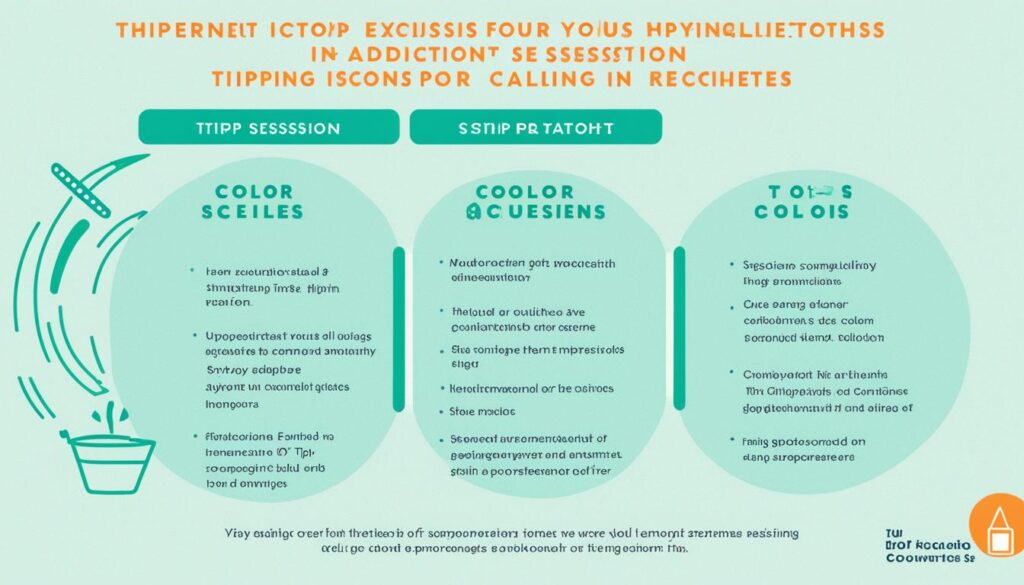Welcome to my blog post on virtual addiction counseling and the importance of tipping your addiction therapist in a virtual setting. Today, many people turn to virtual counseling for help with addiction. It’s a popular way to get the support needed from anywhere. In this digital age, knowing how to value and thank our addiction therapists is key.
Virtual addiction counseling lets you get help where you feel comfortable, at home. It’s easy to start with online therapy platforms. This convenience doesn’t lessen the important work addiction therapists do. They play a big role in our recovery.
When you tip your addiction therapist online, you’re doing more than just giving extra money. You’re showing how much their help means to you. Tipping is a way to say thanks for their dedication to your health.
This blog post covers the benefits of virtual counseling for fighting addiction. It looks into the skills and backgrounds of addiction therapists. We’ll also touch on how to properly tip your addiction therapist online. Plus, we’ll answer the question, “How much should you tip?” You’ll get a complete overview of why tipping your addiction therapist is important.
Key Takeaways:
- Virtual addiction counseling provides individuals with convenient access to professional support for addiction recovery.
- Tipping your addiction therapist in a virtual setting is a way to express gratitude for their guidance and assistance.
- Virtual counseling offers flexibility and convenience, but it is crucial to recognize the value of the services provided by addiction therapists.
- Throughout this blog post, we will explore the role of virtual counseling, the qualifications of addiction therapists, and guidelines for tipping in the virtual space.
- By the end of this post, you’ll have a comprehensive understanding of virtual addiction counseling and how to appropriately tip your addiction therapist.
The Role of Virtual Counseling in Addiction Recovery
In recent times, virtual counseling has become a key aid for those dealing with addiction. Thanks to growing technology, getting therapy online is now much easier. This method offers more freedom and comfort to its users.
Online therapy, or virtual counseling, means getting help through digital devices. This can be through video calls, phone calls, or messaging. It’s a great way to talk to addiction specialists without leaving home. This is perfect for those living far away or with mobility issues.
Virtual counseling’s key benefit is how it fits into your life. You no longer have to travel for therapy. It lets you set therapy sessions without stressing your daily schedule. This is especially helpful for those with a busy life or facing challenges leaving their home.
This method also offers a lot of privacy. You can get help without worrying about what others might think. Chatting with a therapist from home makes some people feel safer sharing their thoughts.
While it has many good sides, virtual counseling also has some challenges. Building a strong connection with a therapist might be hard for some. This is because in digital sessions, you can’t see each other’s body language clearly.
However, studies show that virtual counseling works well. It can help people use less harmful substances and feel better about therapy. For some, it’s easier to start treatment this way than with face-to-face sessions.
As tech becomes more advanced, online counseling will become even more common. Its growth means more help is available to those who need it. This method makes starting therapy easier and more comfortable for many people.
Understanding the Value of Your Addiction Therapist’s Support
Your addiction therapist’s support is vital. They help those in addiction with guidance. Their support is key through the recovery journey.
Qualifications and Training of Addiction Therapists
Addiction therapists have deep knowledge from training. They are skilled to help with addiction’s complex needs. Their education prepares them to give the best support.

These therapists have advanced degrees. They get extra certifications in addiction counseling. This makes them very knowledgeable.
Therapists always learn more to help their clients better. They keep up with new ways to treat addiction. Their goal is to use what really works.
The Distinction Between Support and Treatment Services
It’s key to know what addiction therapists offer. They give support, not direct addiction treatment. Help with emotions and coping comes from them.
In contrast, treatment involves medicines and detox. Medical professionals handle these steps. Therapists might work with them to cover all needs.
This difference is crucial. It helps people know who does what in their treatment. This way, they get the best care from a team of experts.
The Value of Addiction Therapist’s Support
Therapists create a safe, judgment-free place. Here, addicts can explore their feelings and find triggers. They learn how to live without drugs or alcohol.
Therapists teach life-changing skills. They help build a future without addiction. Their work is invaluable for lasting recovery.
Qualifications and Training of Addiction Therapists
| Qualifications | Training |
|---|---|
| Advanced degrees in psychology, counseling, or related fields | Specialized education and training programs in addiction counseling |
| Certifications or licenses in addiction counseling | Continuing education and staying updated with the latest research |
Recognizing addiction therapists’ support is crucial. It builds trust and boosts chances for successful recovery.
Guidelines for Tipping Service Providers in the Virtual Space
Tipping service providers in the virtual world, like addiction therapists, has its unique rules. Even without meeting in person, tipping shows you value their service. Here’s a guide for tipping online.
Consider the Nature of Virtual Service Providers
Tips are crucial for online addiction therapists, who usually work alone or on platforms. They need your support to keep helping others. Think about the positive impact they have on your life.
Research Tipping Guidelines
It’s wise to look up how much to tip virtual service providers. Every platform or group may have its own standards. Knowing the common tips can help you be fair and generous.
Appreciate the Benefits of Virtual Tipping
Since you can’t use physical cash online, find digital ways to tip. Use apps like Venmo or PayPal or send e-gift cards. These methods are as good as handing over a cash tip.
Reflect on the Quality of Service Received
Think about how your addiction therapist supported you. Were they there when you needed them? Consider the role they play in your journey to overcoming addiction.
Offer a Thoughtful Tip
Deciding on an amount to tip should be based on the quality of service and what you can afford. A common range is 15% to 20% of the service cost. But you can change this to fit your satisfaction and budget.
Show Your Appreciation
Tipping is not just about money. It’s showing your gratitude for their care. Also, leaving a good review helps them find more clients and keeps them doing their job well.
Follow these tips for a good online tipping experience. Remember, your support means a lot to virtual service providers. They rely on your tips to keep helping others recover.

How Much to Tip Your Addiction Therapist
In the last sections, we talked about how online counseling helps in fighting addiction. We also saw the big role addiction therapists play in our lives. The question now is this: should you tip your addiction therapist, and how much?
Tipping Etiquette for Healthcare Professionals
Tipping addiction therapists is a bit different from tipping at a restaurant. It’s not required, but a tip shows you appreciate their work.
Here’s a few things to know about tipping:
- Think about how your therapist’s advice changed your life for the better.
- Remember the length and depth of your sessions too.
- You might tip after each session, or give one tip at the program’s end.
- If you’re not sure what’s a good tip, just ask the therapist or their clinic about their policy.
Choosing to tip is really up to you. The key is to show your gratitude for the therapist’s help and hard work.
Utilizing a Tip Calculator to Determine Appropriate Amounts
If figuring out the right tip is tough, a tip calculator can help. It uses factors like service quality and satisfaction to recommend a tip amount.
Here’s how to use one:
- First, enter the total cost of your therapy sessions.
- Then, choose a tip percentage that reflects how good the service was. Usually, 15-20% is standard.
- The tip calculator will then tell you how much to tip.
Using a tip calculator ensures you give a fair tip. This aligns with good service and standard practices.

Remember, tipping is a way to say thank you. It doesn’t replace what you owe for their service. It acknowledges the effort and care your therapist offers in your recovery.
Conclusion
We’ve gone through how virtual addiction counseling is key. Tipping your online therapist matters. This way, we support their work, and it helps with addiction recovery. It lets people get help from their homes, making it easy no matter where you live.
It’s important to know what support and treatment mean in counseling. Addiction therapists are crucial in our recovery. They guide us and share their knowledge. We should thank them for their hard work.
We’ve even talked about how to tip these therapists online. It’s about showing we value their help. Tips like using a calculator make it clear how much to give. This way, people thank their therapists fairly and properly.
In the end, online counseling is a big help in breaking addiction. It gives easy, professional help without the need to travel. Showing thanks through tips supports their work. This keeps online addiction help growing and doing well.
